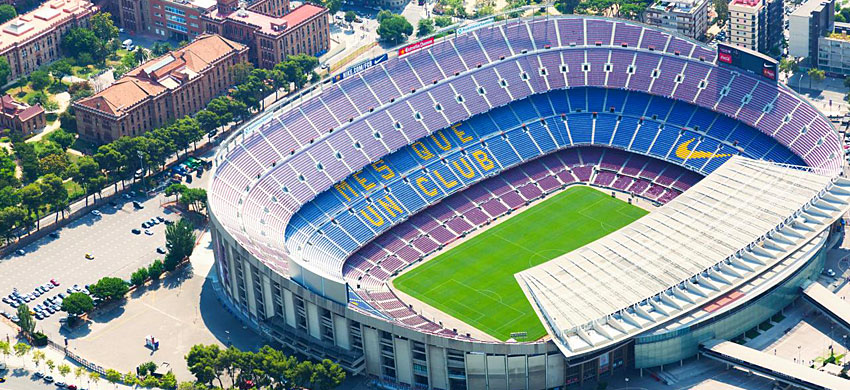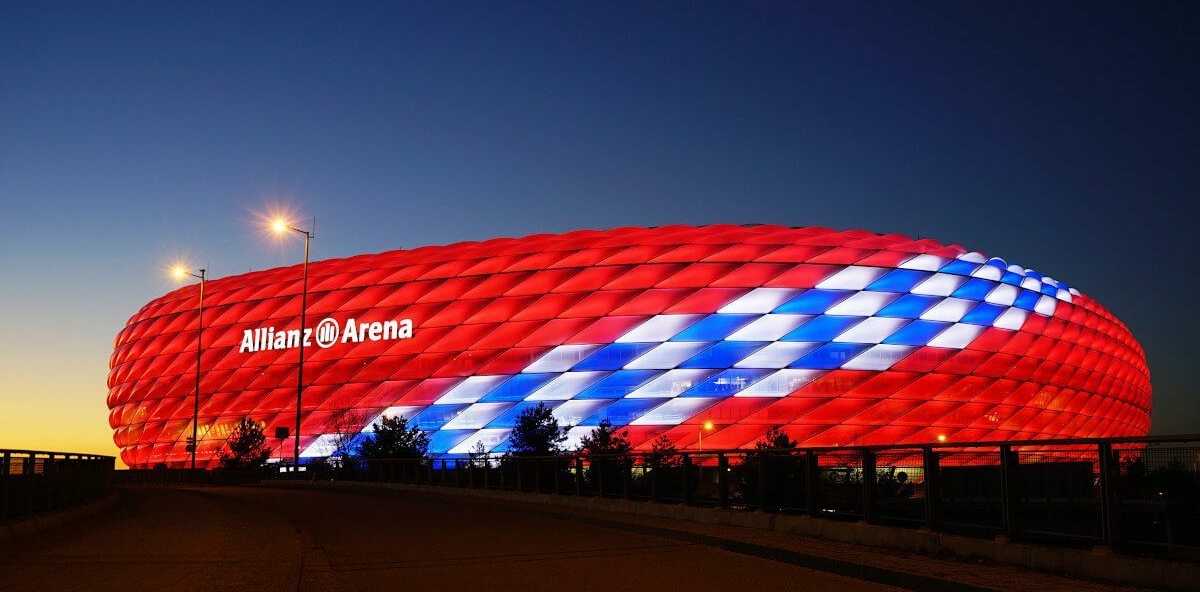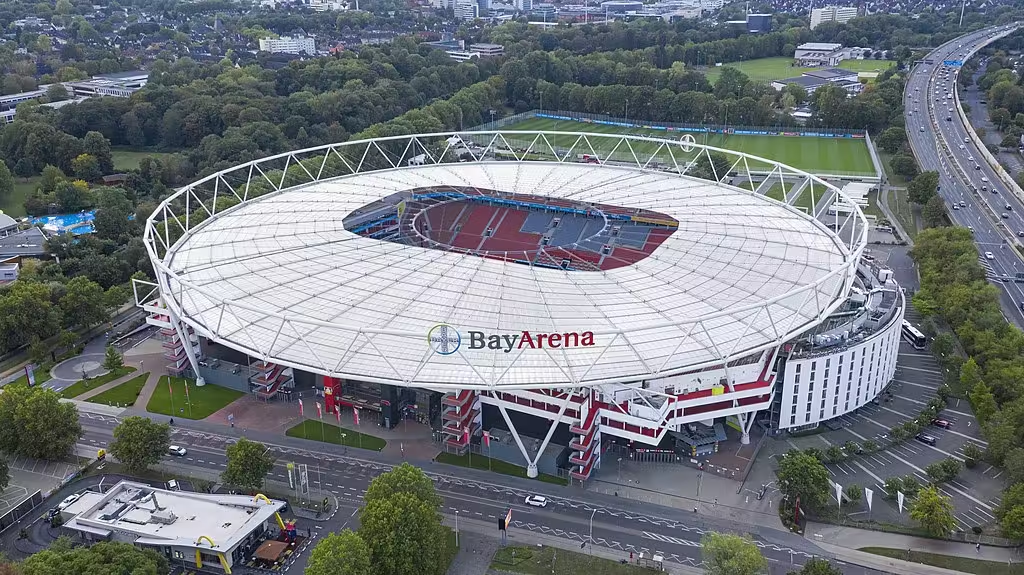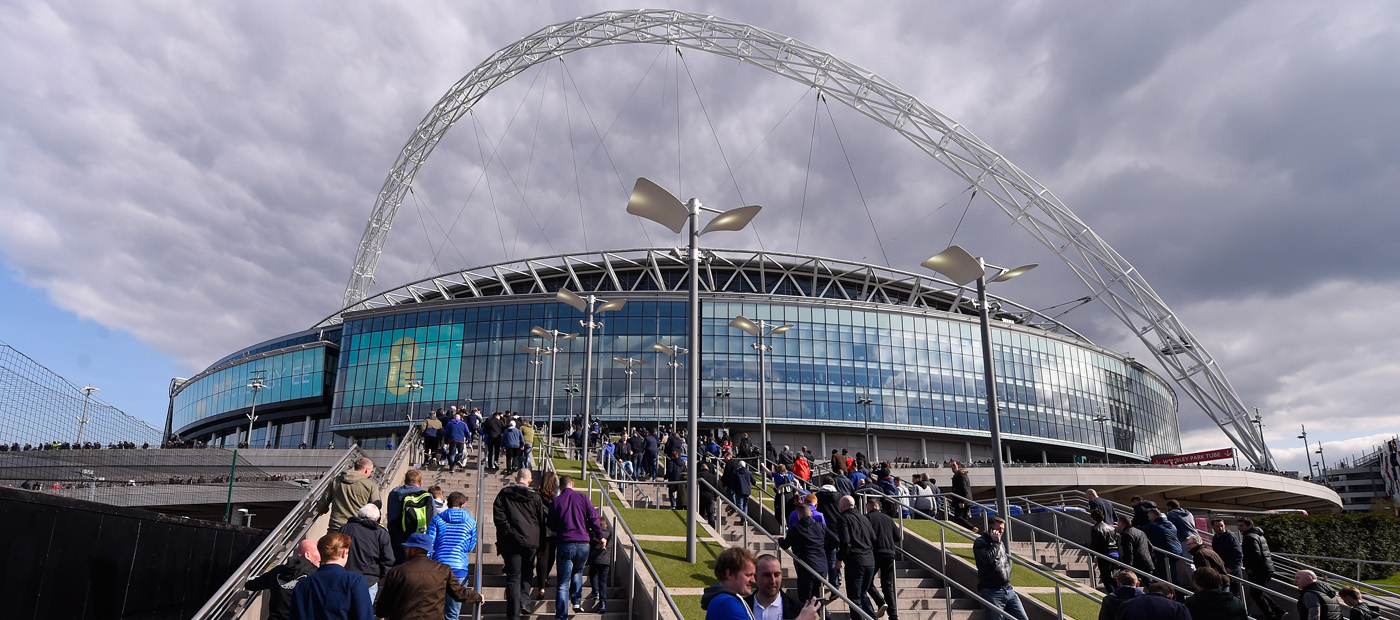Camp Nou is a world-renowned stadium and the home of FC Barcelona. It is an architectural masterpiece, with a seating capacity of almost 100,000, making it the largest stadium in Europe. The stadium is an iconic landmark that embodies the spirit of the city and the club, and it is a must-visit destination for football enthusiasts from all over the world.
Camp Nou has a rich history that dates back to the mid-20th century. The stadium was built to replace FC Barcelona’s previous ground, Camp de Les Corts, which could no longer accommodate the swelling ranks of its supporters. The construction of Camp Nou began on March 28, 1954, and it was officially opened on September 24, 1957. Since then, it has been the home of FC Barcelona and has hosted countless memorable matches and moments throughout the years.
Key Takeaways
- Camp Nou is the largest stadium in Europe and the home of FC Barcelona.
- The stadium has a rich history that dates back to the mid-20th century.
- Camp Nou has hosted countless memorable matches and moments throughout the years.
Camp Nou: The Heart of Barcelona Football
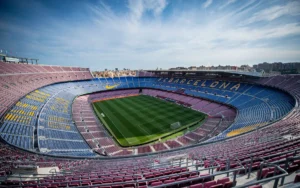
Camp Nou, the home of FC Barcelona, is one of the most iconic football stadiums in the world. It is a place where footballing legends have been made and broken, where dreams have been fulfilled, and where the roar of the crowd echoes through the ages. In this section, we will explore the historical, architectural, and renovation aspects of Camp Nou.
Historical Genesis
Camp Nou was inaugurated in 1957, replacing the old Les Corts Stadium. The name “Camp Nou” means “new field” in Catalan, and it was designed by architects Francesc Mitjans, Josep Soteras, and Lorenzo García-Barbón. The stadium has a seating capacity of 99,354, making it the largest stadium in Europe and the third-largest in the world.
Architectural Grandeur
Camp Nou’s architectural grandeur lies in its simplicity and functionality. The stadium is designed in a bowl shape, with steep stands that give spectators an unobstructed view of the pitch. The roof is supported by a series of slender columns, which create a feeling of openness and lightness. The stadium’s façade is made up of exposed concrete, which gives it a modernist feel.
Renovations and Expansions
Over the years, Camp Nou has undergone several renovations and expansions to keep up with the changing times. In 1982, the stadium hosted the FIFA World Cup, which led to the installation of new floodlights and the construction of a new press box. In 1994, the stadium was expanded to include a third tier, which increased its seating capacity to over 100,000. In 2017, FC Barcelona announced plans to renovate the stadium, which will increase its seating capacity to 105,000 and include a new roof and a new exterior façade.
In conclusion, Camp Nou is not just a football stadium, but a symbol of the sporting legacy of FC Barcelona. Its historical significance, architectural grandeur, and constant evolution make it a must-visit destination for football fans around the world.
Memorable Matches and Moments
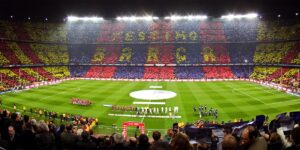
Camp Nou has been the stage for some of the most memorable matches and moments in football history. From legendary games to iconic players and records, the stadium has witnessed it all.
Legendary Games
One of the most memorable matches in the history of Camp Nou was the 1999 Champions League final between Manchester United and Bayern Munich. With Bayern leading 1-0, United scored two goals in injury time to win the match 2-1 and complete a historic treble. The comeback is still considered one of the greatest in football history.
Another unforgettable match was the 5-0 victory of Barcelona over Real Madrid in 2010. The match, known as “El Clasico,” saw Barcelona dominate from start to finish, with Lionel Messi scoring a hat-trick and Xavi and Pedro adding the other two goals. The victory was a statement of Barcelona’s dominance over their arch-rivals.
Iconic Players and Records

Camp Nou has also been the stage for some of the greatest players in football history. Lionel Messi, widely considered one of the greatest players of all time, has scored countless goals at the stadium and has won numerous titles with Barcelona.
Other iconic players who have graced the Camp Nou pitch include Johan Cruyff, Ronaldinho, and Xavi. Cruyff, who played for Barcelona in the 1970s, is considered one of the greatest players of all time and is credited with revolutionizing the way the game is played. Ronaldinho, who played for Barcelona from 2003 to 2008, was known for his incredible skill and flair and helped Barcelona win two La Liga titles and the Champions League. Xavi, who played for Barcelona from 1998 to 2015, was known for his incredible passing ability and helped Barcelona win numerous titles, including the Champions League in 2006, 2009, and 2011.
Camp Nou has also been the site of numerous records and milestones. Lionel Messi, for example, has scored more goals at the stadium than any other player in history. The stadium has also hosted numerous World Cup matches, including the final of the 1982 tournament between Italy and West Germany.
Cultural Impact and Fan Experience
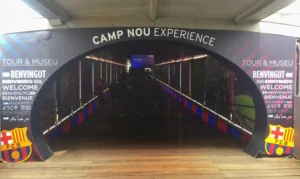
Matchday Atmosphere
Camp Nou is renowned for its electrifying matchday atmosphere. The stadium has a seating capacity of 99,354, making it the largest stadium in Europe. On matchdays, the stadium is filled with passionate fans who create an unforgettable atmosphere. The energy and enthusiasm of the fans are infectious and make for an unforgettable experience.
The stadium’s design and architecture also contribute to the unique atmosphere. The steep stands bring the fans closer to the action on the pitch, creating an intimate and intense environment. The stadium’s acoustics are also designed to amplify the noise generated by the fans, adding to the overall atmosphere.
Museum and Tours
Camp Nou is not just a stadium; it is also a museum that celebrates the rich history of FC Barcelona. The museum houses an impressive collection of memorabilia, including trophies, photographs, and other artifacts that trace the club’s history. Visitors can explore the museum at their leisure and learn about the club’s legendary players, coaches, and moments.
In addition to the museum, Camp Nou also offers tours of the stadium. Visitors can explore the stadium’s facilities, including the locker rooms, press room, and player’s tunnel. The tour also includes a visit to the pitch, where visitors can stand on the same hallowed ground as their favorite players.
Overall, the museum and tours offer visitors a unique insight into the history and culture of FC Barcelona. The experience is a must-see for any football fan or anyone interested in the rich cultural heritage of Barcelona.
Frequently Asked Questions
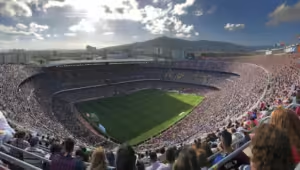
What are the operating hours for the Camp Nou tour?
The Camp Nou tour operates every day of the week, except for Christmas Day and New Year’s Day. The tour hours are from 10 AM to 6:30 PM, with the last entry being at 5:30 PM.
How much does the Camp Nou tour cost?
The cost of the Camp Nou tour varies depending on the type of tour and age group. The basic tour for adults costs €26, while children under the age of 13 can enter for €20. There are also more premium tours available, such as the Champions Experience, which costs €79 for adults and €64 for children.
Can you visit Camp Nou while it is undergoing renovations?
Yes, visitors can still visit Camp Nou while it is undergoing renovations. However, some areas of the stadium may be inaccessible or closed off during the renovations.
Why is Camp Nou considered a significant landmark in football?
Camp Nou is considered a significant landmark in football because it is the home stadium of FC Barcelona, one of the most successful football clubs in the world. The stadium has a rich history, having hosted numerous important matches, including the 1982 FIFA World Cup and the 1992 Summer Olympics. Additionally, the stadium has been the site of many memorable moments in football history, such as Lionel Messi’s record-breaking 91st goal in 2012.
Are there any special deals, like a 2 for 1, for the Nou Camp tour?
There are no special deals for the Camp Nou tour, such as a 2 for 1 offer. However, visitors can purchase tickets online in advance, which may offer a slight discount compared to purchasing tickets at the stadium.
Does Camp Nou offer free entry at any point?
Unfortunately, Camp Nou does not offer free entry at any point. Visitors must purchase a ticket to enter the stadium, even if they only wish to visit the club shop or museum.
Other Articles:
Also Check: Anfield: Home of Liverpool’s Glorious Legacy – Where Red Dreams Soar
Also See: Unveiling the Magnificence of Moshood Abiola National Stadium: Emblem of Nigerian Splendor
Also see: The Iconic Ellis Park Stadium: A Legacy of Sports and Entertainment in Johannesburg
Also See: Stade Du 5 Juillet: A Monument of Sporting Triumphs and Unity in Algeria
Also See: Cairo International Stadium: Egypt’s Iconic Venue for Sports and Culture
